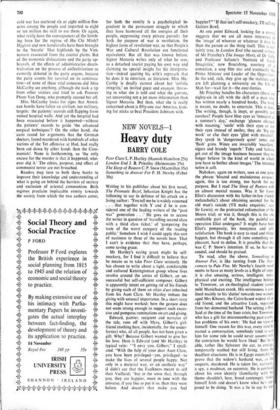NEW NOVELS-1
Heavy duty
BARRY COLE
Poor Clare L.P. Hartley (Hamish Hamilton 25s) London End J. B. Priestley (Heinemann 35s) The Sleep of Reason C. P. Snow (Macmillan 35s) Something to Answer For P. H. Newby (Faber 30s) Writing to his publisher about his first novel, The Prismatic Bezel, Sebastian Knight has the following to say in defence of his attack on a living author: 'You tell me he is widely esteemed . . . that together with Y and Z he is con- sidered one of the leading writers of the "post war" generation . . .' He goes on to accuse the writer in question of 'travelling second class with a third class ticket,' of 'pampering the taste of the worst category of the reading public.' Somehow I wish I could apply this sort of nastiness to three of the novels here. That I can't is evidence that they have, perhaps, some saving grace.
Mr Hartley's saving grace might be self- mockery, for I find it difficult to believe that he means us to take Poor Clare seriously. He h6s chosen to write about a tight, comfortable and cultured Kensingtonian group whose lives revolve around the antics of Gilbert, an un- successful but self-sufficient composer. Gilbert is apparently intent on getting rid of his friends by giving each of them an objet d'art inherited from his Aunt Clare. Mr Hartley imbues the giving with unusual importance. In a short story this might have worked; here the gesture does not seem strong enough to, support such exces- sive and pompous ruminations on art and giving.
Edward, painter, recipient and narrator of the tale, runs off with Myra, Gilbert's girl- friend (nothing here, incidentally, for the under- forties) who, of all people, has not been given a gift. Why? Because Gilbert wanted to give her his love. Here is Edward (and Mr Hartley) in typical vein: "I envy you, Gilbert," I retali- ated. "With the help of your dear Aunt Clare, you have been privileged—yes, privileged—to make the lives of several people happy. Not only in a material way, or an aesthetic way" (I didn't say that the Faulkners meant to sell their Vuillard), "but in the sense that, through you, they are happier, more in tune with the universe, if you like so put it so, than they were before. And doesn't that make you feel happier?" ' If that isn't self-mockery, I'll sell my Golden Bowl.
At one point Edward, looking for a moral, suggests that we are all more interested in the 'image' of whoever or whatever it may be than the person or the thing itself. This is cer. tainly true, in London End (the second witinIc of Mr Priestley's The Image Men), of Dr Tub) and Professor Saltana's 'Institute of Social Imagistics,' now flourishing, courtesy of a comedian, a sexy film star and eventually the Prime Minister and Leader of the Opposition. In the end, rich, they give up the institute and are left planning a university on the Isle of Man for—wait for it—the over-forties.
Mr Priestley handles his characters (there are eighty-six in all) with the skill of a man who has written nearly a hundred books. The book is meant, no doubt, to entertain. This it does. The writing, though, is inept, or possibly ju,t careless? People have blue eyes as 'innocent as a summer's day,' exchange 'glances charged with meaning,' smile' with their eyes or use their eyes instead of smiles; they do 'big eye work' or else their eyes 'glint with mischief'; they speak in 'dangerously quiet' tones and 'flash' grins. Wines are invariably 'excellent; cigars and brandy 'superb.' Tuby and Saltana getout of the image business because they no longer believe 'in the kind of world in which you have to bother about images.' The intended satire is soft.
Nabokov, again on writers, uses at one point the phrase 'bloated and malodorous corpses'; again, this is too strong, too harsh for my purpose. But I read The Sleep of Reason with an almost mental nausea. Was it Sir Lewis Eliot's discussion with his father-in-law ('senile melancholia') about obtaining seconal for the old man's suicide (I'll make enquiries,' says Sir Lewis); or the protracted exhumation of the Moors trial; or was it, though this is the one creditable part of the book, the painful eye operation Eliot undergoes? It might have been Eliot's pomposity, his noseyness and self- satisfaction. The book is easy to read and things happen, but through it all runs something un- pleasant, hard to define. It is possible that this was C. P. Snow's intention. If so, he has suc- ceeded, and should be praised.
To read, after the above, Something to Answer For, is like turning from The New- comers to Pale Fire. Mr Newby's fourth novel seems to have as many levels as a flight of steps; it is also amusing, serious, intelligent, meta- physical and exciting. The intelligence belongs to Townrow, an ex-theological student turned mild Manichaean crook. His seriousness is con- fined mainly to his 'duties' towards two women, aged Mrs Khoury, the Cairo-based widow of an old friend, and the attractive Leah, separated from her demented husband. The setting is Pon Said at the time of the Suez crisis, but Townrow, who has a gift for misremembering past events, has problems of his own: 'He had no view of himself. One reason for this was, every time he started a conversation, somebody tried to cast him for some role he could never assume with the conviction he would have liked.' But he is able, rather like Sylvester the cat, to emerge, temporarily scathed but still living, from the deadliest situations. He is in Egypt ostensibly to prove that the widow's husband was, as she suspects, murdered. He is taken for, variouslY• a spy, a madman, an eccentric. He is confused about his own identity (familiarity with the theme shouldn't, here, breed contempt), thinks himself Irish and doesn't know what his sup- posed to be doing. 'It was a lie to say he W running away . . . A man who stayed put was in decay.' The writing is pure art: there is a court scene, where he is accused of being an Israeli spy, which is incomparably better than C. P. Snow's (a result of imagination rather than access to a transcript?).
When British paratroops arrive and all is dis- rupted, Townrow remains irrepressible. By the end of the book 'He had fewer illusions. He now knew he could not afford to surrender the smallest splinter of judgment to any govern- ment organisation, cause or campaign. He was to trust only the immediate promptings, what the eye saw, the nose smelled, and his hand touched.' Proud and arrogant, Townrow comes to realise that he is entering middle age think- ing, unfashionably, of honour. It is a very believable honour and makes look quite childish the performances of those who insist or imply that the world should belong mainly to any particular generation.







































 Previous page
Previous page